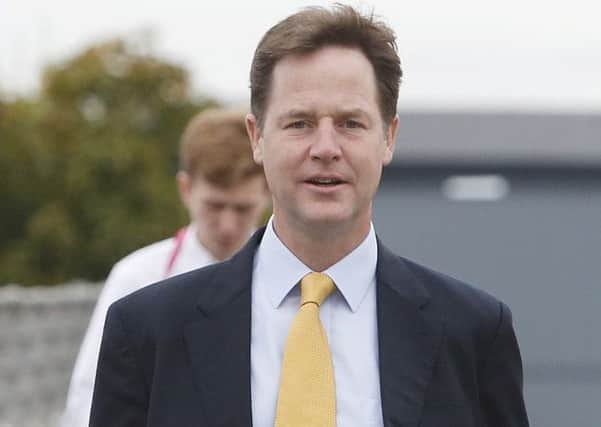Clegg and Cameron at war over drugs law reform


Deputy Prime Minister Nick Clegg said the survey - which found the “toughness” of a country’s drug enforcement policy did not affect the level of substance abuse - showed the “war on drugs” was failing.
The Liberal Democrat leader said there was now an urgent need for reform and accused the Conservatives of a “totally misplaced, outdated, backward-looking view” of the issue.
Advertisement
Hide AdAdvertisement
Hide AdDowning Street hit back, warning the Lib Dems’ calls for decriminalisation sent “an incredibly dangerous message” and insisting that there would be no change in the current approach.
The dispute, which his been festering for months, broke out after the Home Office finally agreed to release the report - which the Lib Dems had originally commissioned - comparing drugs policies in different countries.
Appearing on his weekly LBC radio phone-in, Mr Clegg complained that the Conservatives had tried to block its release.
“The report this morning, pushed by me and the Liberal Democrats against resistance from the Conservatives, is the first time in a generation that a Government-commissioned report has shown the evidence that the way we are doing things doesn’t make sense,” he said.
Advertisement
Hide AdAdvertisement
Hide AdMr Clegg, who called for the abolition of prison sentences for the possession of drugs for personal use earlier this year, said the report should come as a wake-up call to the other parties that the current system was failing.
“This war on drugs is not working. We have got to get away from this facile view that just talking tough solves this problem. It is betrayal of those families of those 2,000 people dying every year in our country,” he said.
“The evidence shows that a smarter approach where you deal with addicts as people who need treatment so they don’t remain hooked on the stuff that is being pushed at them by criminals.
“That actually frees up resources that allows you to go after the pushers and the criminal gangs and the ‘Mister Bigs’ who should be behind bars.
Advertisement
Hide AdAdvertisement
Hide Ad“I cannot understand why on earth we as a society are putting a thousand people behind bars every year who have only been found to possess drugs for personal use. They have done nothing else wrong.”
A Number 10 source however insisted that the report provided “no support whatsoever” for the Lib Dems’ policy of decriminalisation.
“The Lib Dem policy would see drug dealers getting off scot-free and send an incredibly dangerous message to young people about the risks of taking drugs,” the source said.
“As the report makes very clear, the Government’s approach already provides a good balance between enforcement and treatment, drug use is plummeting as a result and there is simply no chance that we will entertain such a reckless change of course .”
Advertisement
Hide AdAdvertisement
Hide AdIn an international comparators study, the Home Office looked at different approaches to drugs policy and treatment in a number of countries, including some that have harsh criminal sanctions for users and some that have effectively decriminalised possession of drugs.
The study found no evidence that levels of drug use were affected by how “tough” or “soft” a government’s response is, suggesting criminal sanctions have little impact.
The report also found positive health outcomes in Portugal, where possession of drugs is treated as a health matter rather a criminal issue, and no increase in use.
Worse health outcomes were found in the Czech Republic after drug possession was criminalised, while no evidence of lower use was discovered.
Advertisement
Hide AdAdvertisement
Hide AdMeanwhile, a separate report calls for a blanket ban on supply of so-called legal highs.
Currently, when a legal high is outlawed, illegal-drug chemists are getting around the law by tweaking the chemical compound and creating a new substance.
David Cameron’s official spokesman made clear that the report had not persuaded the Prime Minister to change his view on drug policy.
“The Prime Minister thinks the current approach the Government is taking is the right one and isn’t going to change,” the spokesman told a regular Westminster media briefing.
Advertisement
Hide AdAdvertisement
Hide Ad“The Government said in 2010 that there would be a comparative analysis and that is what has been done. At the heart of it is that countries take the approach that is most effective in each of their territories.
“The Government’s policy is evidence-based, and the evidence is that drug use is falling.”
Asked whether Mr Cameron regarded his current policy as successful, the spokesman replied: “It is, because drug use is falling.”
The spokesman said it was “no surprise” that Conservative and Liberal Democrat ministers would take different approaches on policies for their manifestos for next year’s election.
Advertisement
Hide AdAdvertisement
Hide Ad“It is not the first time that, in terms of their future manifestos, the parties have taken different approaches,” he said.
He did not deny suggestions that Downing Street had delayed the report’s publication. Asked if this was the case, he replied: “As to timetabling, I think having the right policy is by far the most important thing.”